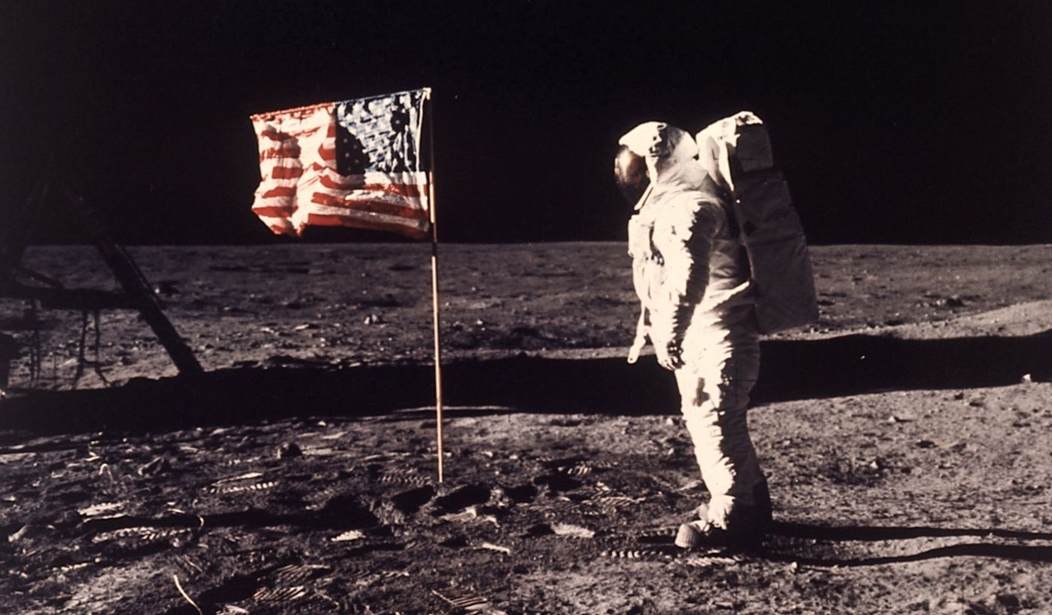50 years ago three American citizens crammed into a small metal can and soared away from their country – and their world – to land on a barren rock deeper in space.
Their names – Neil Armstrong, Buzz Aldrin, and Michael Collins - would be known to history forever as heroes that braved the great unknown for American, and indeed human, progress.
Apollo 11 launched on July 16, 1969 from Kennedy Space Center in Florida. The lunar module containing Armstrong and Aldrin landed on the moon’s surface on July 20 and the astronauts soon left back for Earth on July 22.
The achievement of Apollo 11 cannot be understated, whether from the scientific, political, or cultural angles. Apollo 11 took place in the midst of the Cold War, where technological competition between the Soviet Union and Communist bloc against the United States and free nations of the world saw perpetual escalation, as both sought to contain the other and bring remaining neutral nations and peoples to their cause.
Space was the fantastical frontier on which the blocs’ prowess and strength was to be tested and demonstrated. For millennia humans had looked up to the stars with wonder and awe, spawning countless legends, theories, and customs. Yet even the brightest minds and richest expeditions as of far could at best only be an observer aided by heightened buildings and terrain and polished pieces of crystal and glass.
Yet by the 1950’s aeronautical technology had advanced just enough to change all of that. The Soviets launched Sputnik 1 into the Earth’s orbit in October 1957, the first manmade satellite. Sputnik was a research satellite studying the properties of the Earth’s upper atmosphere as well as providing conditions information about Earth orbits.
Recommended
While Sputnik shut down after a few weeks and crashed a few months later, it still showed the world that it was entering a new technological era. It was one where the feared militarization and economic usage of space, whether through satellites, stations, flights, or missiles, not only seemingly provided substantial technological advantage to those who could wield it but was an incredible propaganda and morale tool for those successful.
It was under these circumstances that Apollo 11 was hatched and pushed forward. As President John F. Kennedy announced to Congressi n May 1961, “[n]o single space project in this period will be more impressive to mankind, or more important for the long-range exploration of space, and none will be so difficult or expensive to accomplish.”
Yet just 8 years later the American flag would be planted on the moon, still to now the only nation to have done so. “For every American, this has to be the proudest day of our lives” said President Richard Nixon as he called Armstrong and Aldrin on the moon on July 21, 1969.
Aldrin was so moved by walking on the lunar surface that he took Holy Communion on the moon. Pouring wine into a cup he had inside his large astronaut suit, eating bread, and reading the Gospel of John on a card he brought.
Apollo 11 wasn’t cheap. The entire project cost an estimated $25.4 billion in then’s dollars, which amounts to roughly $186 billion in 2019 dollars. Yet the impacts were huge. We see nowadays how achievements in cosmology, such as Katie Bouman’s work in helping image a supermassive black hole for the first time this year, inspire countless not only in the scientific fields but even ordinary citizens.
Americans generally were proud of that achievement at the time, even if space developments for the decades after slowed and interest waned as the then-‘astronomical’ cost made some Americans uneasy.
We live in a similar era nowadays where technology has advanced so far again that incredible new achievements have become possible in the world of aeronautics. We see each day how both the government and private sector are exploring new ways to expand America’s and humanity’s reach around our planet and within our solar system.
Each day now rockets, satellites, telescopes, stations, and more are being designed, prepared, and launched. Voyager 2 recently joined Voyager 1 a few months ago in interstellar space, outside the reach of our solar system. The public supports space investment by large majorities. 77% now want to increase or maintain NASA funding. The private sector is now just as much, if not more, a player than government in space as large corporations see the immense potential out there in the cosmos.
In 50 years I hope we won’t be just commemorating the 100thanniversary of Apollo 11. Rather, I hope we will be commemorating new discoveries and achievements in the realm of space – what those achievements are remain to be seen, as each day countless dreamers across this great country are working tirelessly on.
Erich Reimer is a Captain in the United States Army. He previously served as a government affairs lawyer and media commentator. Views expressed are his own and not those of the Department of Defense.

























Join the conversation as a VIP Member